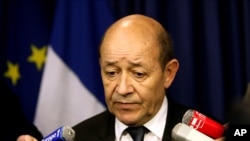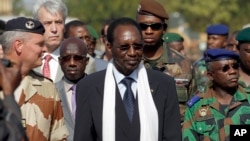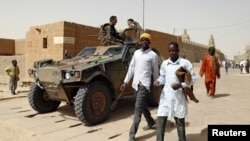French-backed Malian forces are securing the town of Kidal, the last major stronghold of Islamist militants in the country's north.
Military officials say Friday that Islamist rebels have left the town near the Algerian border and are believed to be hiding in the surrounding mountains and desert.
An official with the Economic Community of West African States (ECOWAS) says the first phase of the international operation in Mali is about to end. Political director Abdel-Fatau Musah said regional forces with AFISMA (African-led International Support Mission to Mali) are being deployed to liberated regions in the country's north.
“AFISMA is already preparing a contingency plan for that to occupy and secure the liberated zones. And to also take active measures to make sure that those forces that are on the run are neutralized, so that they don’t constitute a permanent threat in the desert,” said Musah.
Meanwhile, French President Francois Hollande is preparing for a Saturday visit to Mali, three weeks after French forces launched their intervention against Islamist militants in the former French colony.
A statement from the president's office says he will be accompanied by the defense and development ministers.
On Thursday, French Defense Minister Jean-Yves Le Drian declared the intervention in Mali a success, but added that Mali's situation is not yet secure. The minister said in an interview on French radio that the Malians must establish "a reconciliation process" to ensure a stable future.
Mali's interim president, Dioncounda Traore, has said he will not hold talks with Islamists who controlled the north before French and Malian forces drove them out.
But Traore told French radio Thursday he would consider meeting with the Tuareg rebel group MNLA if it drops its claim to Malian territory.
The MNLA has been fighting for a Tuareg homeland. It seized part of northern Mali last year and later joined forces with Islamic militants when the Malian government collapsed.
The Tuaregs later split with the militants when they imposed conservative Islamic law in the north, and the MNLA now says it backs the French military operation in Mali.
Foreign Troop Commitments to Mali
Foreign Troop Commitments to Mali- France 2,000 on the ground, 500 more committed
- Chad to send 2,000
- Nigeria to send 1,200
- Benin to send 650
- Burkina Faso, Niger, Senegal, Togo have committed 500 each
- Guinea and Ghana are also sending troops
An official with the Economic Community of West African States (ECOWAS) says the first phase of the international operation in Mali is about to end. Political director Abdel-Fatau Musah said regional forces with AFISMA (African-led International Support Mission to Mali) are being deployed to liberated regions in the country's north.
“AFISMA is already preparing a contingency plan for that to occupy and secure the liberated zones. And to also take active measures to make sure that those forces that are on the run are neutralized, so that they don’t constitute a permanent threat in the desert,” said Musah.
Meanwhile, French President Francois Hollande is preparing for a Saturday visit to Mali, three weeks after French forces launched their intervention against Islamist militants in the former French colony.
A statement from the president's office says he will be accompanied by the defense and development ministers.
On Thursday, French Defense Minister Jean-Yves Le Drian declared the intervention in Mali a success, but added that Mali's situation is not yet secure. The minister said in an interview on French radio that the Malians must establish "a reconciliation process" to ensure a stable future.
Mali's interim president, Dioncounda Traore, has said he will not hold talks with Islamists who controlled the north before French and Malian forces drove them out.
But Traore told French radio Thursday he would consider meeting with the Tuareg rebel group MNLA if it drops its claim to Malian territory.
The MNLA has been fighting for a Tuareg homeland. It seized part of northern Mali last year and later joined forces with Islamic militants when the Malian government collapsed.
The Tuaregs later split with the militants when they imposed conservative Islamic law in the north, and the MNLA now says it backs the French military operation in Mali.
Some information for this report was provided by AP, AFP and Reuters.
Related slide show







